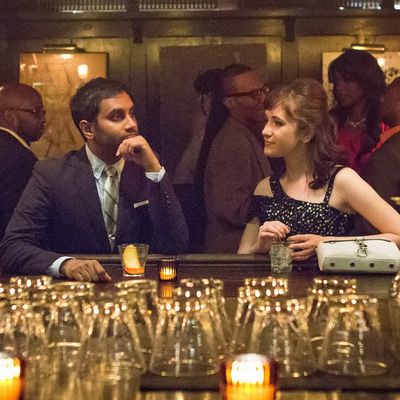
Aziz Ansari and Alan Yang’s new Netflix comedy Master of None, premiering Friday, comes out of the gate strong, with a few terrific episodes that set the tone and pace and vision for the show. It’s naturalistic, with conversational dialogue and a casual vibe; its aesthetic is totally unfussy but highly urbane. The show sees its characters with extremely tender regard, holding up each one gingerly to the light and saying, Look at this person, doing the best he or she can; sometimes that is enough, and sometimes not. Over the course of ten episodes, Master grows beyond just solid comedy into a show that synthesizes ideas about romance, internet culture, entertainment, food hobbyism, gender, race, ethnicity, camaraderie, decency, tidiness, and the scepter of ostensible maturity into a thrillingly assured, engrossing, effective series. Let the Louis C.K.–ing of television continue.
Ansari stars as Dev, a New York–based commercial actor who likes scouring the internet to find the best taco trucks. He suffers from FOMO, as we all do from time to time, though he suffers more from structural racism. Ansari’s actual parents play his parents, to charming effect. In fact, it’s hard to find a part of the show that isn’t charming, from its funky ‘70s opening titles to an endearing subplot about a Paro, the robotic seal therapy doll. About half the episodes are stand-alone, and half involve Dev’s budding romance with Rachel (Noël Wells), a relationship notable for how often it hits those very sweet rom-com-y notes and how often it rejects them completely. (Many times for both.) Dev’s defining characteristic is his enthusiasm; he’s prone to stopping everything to exclaim how great it all is, how cool. He’s onboard to hang out with grandmas. He’s open to advice from a wide variety of sources, including his BFFs (Kelvin Yu, Eric Wareheim, and Lena Waithe, all terrific). Dev can also be a jerk, but only here and there, and only as much as any of the rest of us.
There’s a long history of comedians writing their own tickets in TV, stand-ups, especially. It’s less common now than it was in the ’90s, but it’s still present. Louis C.K. transformed that genre with Louie, a show that transformed auteur television, period. While Louie feels more strongly autobiographical, Master is less so, though, certainly, if you like Ansari’s stand-up, you’ll like the show. Liking the show is possible without liking the stand-up, though, since Master is lower-energy and less tightly wound. There’s a gentler ambiance, a little less of a hard sell. Ansari’s most recent tour morphed his stand-up into fascinating social science, and while Master of None isn’t as educational as all that, it does take a more zoomed-out look at the world, one of the things that distinguishes the series from Girls or Louie. (While Master has a lot in common with both those shows, it’s not driven by misery, self-recrimination, awkwardness, cringe humor, or generalized anxiety or depression — not that there’s anything wrong with that.) Dev’s our main character, and we understand his worldview the most clearly, but the show labors to give everyone a fleshed-out story, a clear identity, some depth and quirk.
Despite the show’s overall strengths, there are a few hiccups. Occasionally it feels a little underacted, and when guest stars like Claire Danes show up and shine, those missed opportunities seem even more glaring. A few moments feel a little too pat, and occasionally scenes have slightly clunky setup dialogue at the top — more forgivable in sketch comedy, when establishing a premise is urgent, less forgivable in this longer form. And every once in a while the show drifts a little far from its overall grounding in reality.
But if Master of None isn’t perfect, it’s awfully damn close. Along with recent shows like Catastrophe, Transparent, and Broad City, Master feels like the point of contemporary half-hour narrative television. They’re shows with something to say, with characters and stories that are otherwise either ignored completely or maligned and misunderstood. There’s an emotional vividness to the shows, a kind of electricity that requires the audience’s empathy to complete the circuit. Each show has its unique voice and drive, an idea that’s theirs. This is what TV can be! How exciting. As Dev himself squeals while hooking up with a fancy-schmancy food critic, This is so cool. I like all of this.

